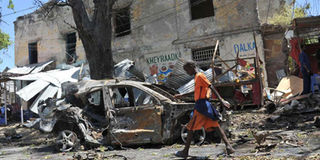Somalia’s proxy wars embolden al-Shabaab

A boy walks past the site of a car bomb attack near a security checkpoint in Mogadishu on March 7, 2019. PHOTO | MOHAMED ABDIWAHAB | AFP
What you need to know:
- But the UAE and Saudi Arabia have mostly been one side on Somalia, often competing against Turkey and Qatar on the other.
- In the past, Somali politicians have bickered over alleged interference from Kenya, Ethiopia, regional bloc IGAD or even Western countries.
- Shabaabs thrived during those times, but often only considered everyone as an invader, rather than appearing to take sides with foreign entities.
Somali militant group al-Shabaab may be profiting from political uncertainties facing the country as it heads into stricter transition timelines that are supposed to culminate in an election later in the year.
And experts say the group, which had largely been disorganised through a relentless aerial drone attacks, is getting a lifeline from proxy wars playing out among Somalia’s partners.
Seventy-two hours after the deadly attack in Mogadishu last Saturday, the local intelligence agency (NISA) claimed “a foreign country” had a hand in plotting for the attack, which al-Shabaab acknowledged committing.
PLOTTED ATTACK
NISA, now headed by former minister and journalist Fahad Yasin Dahir, did not name the actual country that plotted the attack or give proof in public. And Somali government officials were indicating the attack should not be judged as Shabab’s stronger re-emergence.
But observers said the mere mention of an external entity as fuelling local terrorism could indicate Somalia’s politics was not being controlled internally.
“If you ask me what is the problem with Somalia? My answer is Saudi Arabia and UAE; and everybody else is an agent or chance profiteer,” argued Farah Maalim, former deputy speaker of Kenyan Parliament, now a law scholar at the University of Nairobi.
“[The] reasons, oil/gas scare for Saudis and global transit traffic for Dubai. If Somalia develops its oil/gas and modern ports on East Coast, Saudi and UAE will lose.”
To be fair, both the UAE and Saudi governments issued statements condemning the attack and the Somali government neither mentioned the two nor provided public evidence suggesting they may have helped plot the incident.
CRIMINAL ACT
In a statement attributed to Sheikh Abdullah bin Zayed al-Nahyan, the Foreign and International Cooperation Minister, the UAE called the attack a “criminal act” and said his country joins the rest in fighting against all forms of violence and terrorism.
But the UAE and Saudi Arabia have mostly been one side on Somalia, often competing against Turkey and Qatar on the other.
In July, the New York Times reported what it called an intercepted phone conversation implicating Qatar of using al-Shabaab to carry out a terror attack against a port run by the UAE in Somalia. Doha refuted the claims, but experts say it pointed to an increasing use of hired thugs to supplant rivals.
“There are no questions about that (proxy wars in Somalia) and Shabaab’s thrive in chaos,” Dr Abdiwahab Sheikh Abdisamad, head of Southlink Consultants and a commentator on Horn of Africa politics told the Nation.
“Al-Shabaab is a gun for hire. Anybody can use them for their political advantage. With this, they could scare Turks out of town. They could play political role if their master has a common enemy with them,” he argued but warned such a strategy is not sustainable as the group has no long-term loyalty to any of the Middle Eastern powers.
Ali Muhamad Dhere, the presumed Shabaab spokesman said on Monday they had targeted a Turkish convoy of contractors in Mogadishu who they called an “enemy.” But the car bomb explosion killed 85 people, including two Turkish nationals.
HUMANITARIAN SCENE
Turkey has been in Mogadishu’s humanitarian scene since 2011, supplying relief, building a hospital, erecting the largest embassy and training Somalia’s National Army (SNA). It airlifted 16 of the injured survivors for treatment. Qatar transported another 22 to Doha.
Under President Mohamed Farmaajo’s government, both Turkey and Qatar have thrived as UAE ran out of favours, stopped training the army and pulled plugs on various aid projects. Farmaajo refused to take sides in the Gulf blockade on Qatar, despite pressure from Saudis and UAE.
On Monday, Somalia’s opposition figures claimed the suggestion of a foreign entity may be premature and argued the government was passing the buck.
“The attack shows its (al-Shabaab’s) heinous and cowardly actions, but it is unfortunate for the security agencies to fail their responsibility and mislead the public,” Senator Ilyas Hassan, a member of the opposition Forum for National Parties told the Nation.
“Al-Shabaab has benefited from the failure of the current government. That comes from bad political strategy of this regime. Somalia needs both sides (of the Middle East rivals) for its own good.”
In the past, Somali politicians have bickered over alleged interference from Kenya, Ethiopia, regional bloc IGAD or even Western countries. Shabaabs thrived during those times, but often only considered everyone as an invader, rather than appearing to take sides with foreign entities.
“Al-Shabaab is Somali led, Somali run, Somali funded and Somali operated actors operating within Somali territory. Al-Shabaab are profiting from a divided country,” argued Idd Bedel Mohamed, Somalia’s former envoy to the UN.





